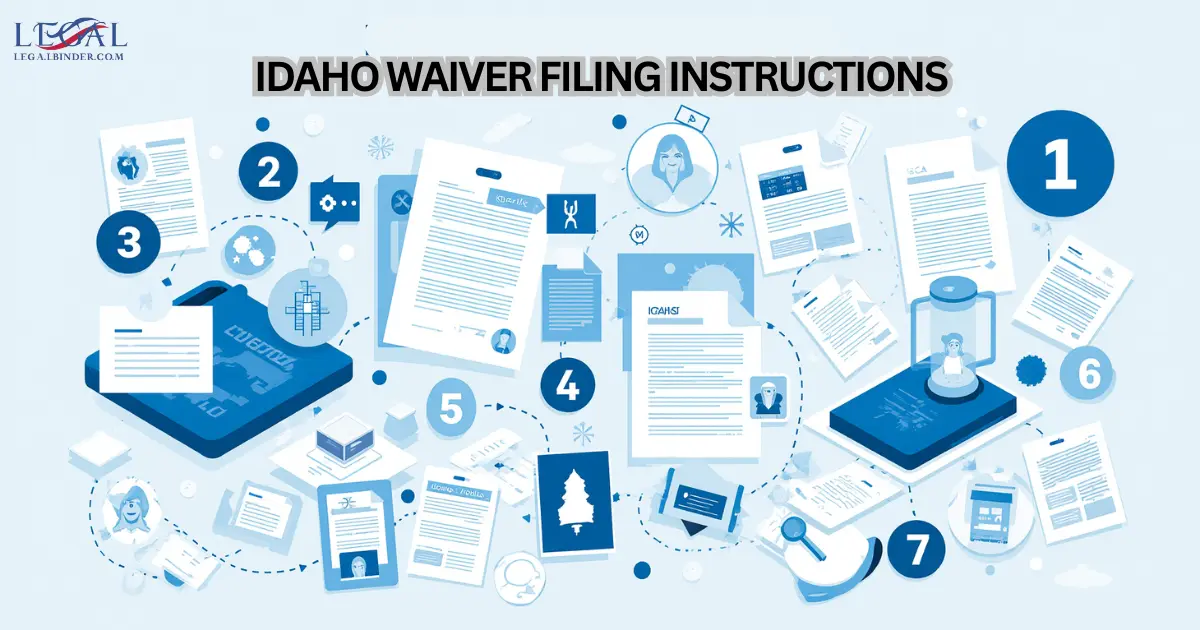Idaho waiver filing helps residents request fee relief from courts and some agencies when paying filing, transcript, or clerk fees would cause financial hardship. This practical 2025 guide walks you through Idaho-specific eligibility, forms, supporting documents, filing steps, processing expectations, and authoritative links so you can submit a complete waiver packet.
This article focuses on Idaho procedures used in district and magistrate courts, and it also explains how to request in forma pauperis status for appeals.
Quick overview — what this Idaho Waiver Filing covers
In Idaho, a waiver (often called an affidavit of indigency or in forma pauperis motion) may excuse payment of:
- Court filing fees (civil, family, small claims).
- Appellate filing fees and transcript costs.
- Fees for certified copies, docketing, and clerk services if permitted by rule.
State-specific requirements (Idaho waiver filing)
Idaho courts require a sworn affidavit describing income, assets, household members, and monthly expenses. Judges decide waivers under Idaho court rules and local procedures.
Key Idaho resources you should consult:
Residency: you should file in the county where the case is pending or where you reside. For appeals, file the in forma pauperis motion with the appellate clerk.
Step-by-step: How to complete & submit
Follow these numbered steps to prepare a correct submission in Idaho.
- Get the right form. Download the Idaho affidavit of indigency or in forma pauperis form from the Idaho Judicial Branch website or ask your county clerk for the local version.
- Gather ID and case details. Have your case number, court name, and government-issued ID ready.
- Collect supporting documents. Include recent pay stubs, benefit award letters (DHW), bank statements, and bills showing monthly obligations.
- Complete the affidavit fully. Provide clear figures for income, assets, household size, and unavoidable expenses—leave no required fields blank.
- Sign under oath. Notarize the affidavit if required, or swear before the clerk when filing in person.
- Attach evidence. Staple copies of benefits letters, pay stubs, and bank statements to the affidavit; include a cover sheet listing attachments.
- File with the appropriate clerk. Submit in person, by mail, or via the court’s e-filing system if available. Request a stamped copy for your records.
- Attend any hearing. If the judge sets a hearing, bring originals and be prepared to explain your financial situation succinctly.
Most Idaho courts expect these documents with a waiver request:
- Affidavit of Indigency / Motion to Proceed In Forma Pauperis (Idaho Judicial Branch form).
- Idaho Department of Health & Welfare benefit letters (Medicaid, SNAP) if applicable.
- Recent pay stubs, Social Security or disability award letters, or unemployment statements.
- Bank statements (1–3 months) and essential bills (rent/mortgage, utilities, medical).
- Case documents or notices that triggered fees (complaint, notice of appeal).
Processing time, fees and deadlines Idaho Waiver Filing
There is usually no fee to submit a waiver application; however, timelines and consequences vary.
- Processing time: Decisions often take days to a few weeks depending on the county court’s caseload.
- Fees: The waiver application itself is usually free; if denied, you must pay fees to proceed.
- Deadlines: File the waiver with initial pleadings or before appellate filing deadlines—late waiver requests can jeopardize your appeal.
Common mistakes to avoid Idaho Waiver Filing
- Failing to use the current Idaho Judicial Branch form — always download the latest version from isc.idaho.gov.
- Submitting incomplete affidavits or inconsistent income figures.
- Not attaching supporting documentation like DHW letters or pay stubs.
- Filing in the wrong court or without a case number.
- Not keeping a stamped copy of your submission.
Use these authoritative Idaho resources to download forms and verify benefits:
FAQs
Q: Will having Idaho Medicaid guarantee an approved waiver?
A: Medicaid is persuasive evidence but not automatic. The court reviews the entire affidavit and supporting documents.
Q: Can prisoners in Idaho request fee waivers?
A: Yes — incarcerated individuals may request in forma pauperis status for civil actions and appeals under Idaho procedures.
Q: What happens if my waiver is denied?
A: If denied, you must pay the required fees to proceed or your case may be delayed or dismissed. Seek legal aid if you cannot pay.
A: County clerk self-help desks, the University of Idaho law clinics, and Idaho legal aid organizations can assist eligible filers.
Q: Is notarization always required?
A: Some Idaho forms require notarization; others allow swearing before the clerk. Confirm local requirements with the county clerk.
Conclusion & CTA
To complete your Idaho waiver filing: download the current affidavit from the Idaho Judicial Branch, attach DHW benefit letters and recent pay stubs, sign under oath, and file with the correct clerk promptly. Accurate, well-documented submissions improve approval chances.
Official forms and county instructions are available at isc.idaho.gov, and benefits verification is available at healthandwelfare.idaho.gov. For templates and related guidance, visit USAlegalBinder.com. Always consult official Idaho sources or a licensed attorney for case-specific legal advice.
